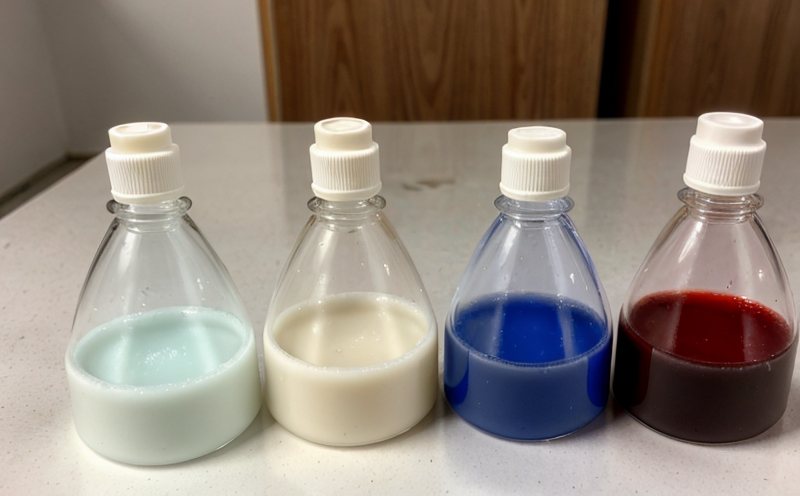ISO 6401 Plasticizer Monomer Testing in Polymers
The ISO standard ISO 6401 specifies a method for determining the amount of monomers present in plasticizers used within polymers. This test is critical for ensuring product quality, compliance with international regulations, and overall safety across various industries that utilize polymer-based materials.
Polymer-based products are widely employed in sectors such as construction, automotive manufacturing, electronics, and textiles due to their versatility and durability. The addition of plasticizers enhances the flexibility and processability of these polymers while maintaining mechanical properties. However, improper formulation or contamination can lead to issues like reduced stability, increased toxicity, or even environmental hazards.
ISO 6401 provides a standardized approach that allows laboratories to accurately quantify monomers in plasticizers. This is essential because monomers are the building blocks of polymers and their presence in concentrations above specified limits may indicate contamination or suboptimal product formulation. The test involves several steps including sample preparation, extraction, derivatization (if necessary), and detection using gas chromatography.
Accurate measurement ensures that products meet stringent quality standards set by regulatory bodies worldwide. Compliance with ISO 6401 not only protects consumer health but also enhances brand reputation and market access. For instance, in the construction industry, where PVC piping is commonly used, adherence to this standard guarantees product longevity and environmental friendliness.
The test procedure outlined in ISO 6401 offers high precision and reliability when conducted by experienced personnel using appropriate equipment. It helps identify potential issues early on, preventing costly recalls or lawsuits. Additionally, it supports research and development efforts aimed at improving polymer formulations without compromising safety.
Understanding the significance of this testing extends beyond mere compliance; it plays a pivotal role in fostering innovation within the plastics industry. By ensuring purity levels meet international standards, manufacturers can explore new applications for their products while maintaining high-quality benchmarks.
In summary, ISO 6401 plasticizer monomer testing is an indispensable tool for maintaining product integrity and regulatory adherence across numerous industries reliant on polymer-based materials. Its importance cannot be overstated given its direct impact on consumer safety, environmental sustainability, and market competitiveness.
Why It Matters
The results obtained from ISO 6401 plasticizer monomer testing are crucial for several reasons:
Consumer Safety: Ensuring that the levels of monomers in plasticizers do not exceed permissible limits protects consumers from potential health risks associated with prolonged exposure to contaminated products.
Regulatory Compliance: Meeting international standards like ISO 6401 helps companies avoid penalties and sanctions imposed by regulatory authorities for non-compliance.
Product Integrity: Accurate measurement ensures that the final product maintains its intended quality characteristics, which is vital for maintaining customer satisfaction and loyalty.
Innovation: By adhering to these stringent testing protocols, manufacturers can explore innovative ways of enhancing polymer performance without compromising safety or regulatory compliance.
Sustainability: Ensuring that the production process minimizes contamination contributes significantly towards sustainable manufacturing practices, thereby reducing waste generation and promoting eco-friendly operations.
R&D Support: The data provided by ISO 6401 tests serves as valuable input for R&D teams working on developing new polymer formulations or improving existing ones.
International Acceptance and Recognition
The widespread adoption of ISO standards, including ISO 6401, underscores their relevance and reliability in the global marketplace. These standards are recognized not only by national governments but also by international organizations such as the European Union (EU) and the United States Food and Drug Administration (FDA).
For instance, many countries have incorporated ISO 6401 into their national regulations for plasticizer use in various applications. Compliance with these standards ensures that products meet not only local requirements but also broader international expectations.
The acceptance of ISO 6401 extends beyond mere certification; it fosters a culture of continuous improvement within manufacturing processes. This commitment to excellence is crucial given the dynamic nature of the plastics industry, where constant innovation drives technological advancements and improved product performance.
Moreover, adherence to such standards enhances interoperability between different manufacturing facilities operating across borders. This seamless integration facilitates smoother supply chains and encourages collaborative efforts among stakeholders involved in polymer-based products development.
In conclusion, the international recognition of ISO 6401 underscores its importance as a benchmark for quality assurance in plasticizer monomer testing. Its global acceptance ensures that manufacturers remain competitive while delivering safe, high-quality products to consumers worldwide.
Competitive Advantage and Market Impact
Compliance with ISO 6401 offers significant advantages that can give businesses a competitive edge in the marketplace:
Enhanced Reputation: Meeting international standards like ISO 6401 enhances a company's reputation, making it more appealing to both customers and investors.
Premium Pricing Power: Products conforming to such stringent testing protocols often command premium prices due to their superior quality assurance.
Better Customer Trust: Consumers are increasingly aware of the importance of product safety; meeting these standards reassures them about the reliability and trustworthiness of a brand.
Innovation Facilitation: The rigorous testing process required by ISO 6401 encourages continuous improvement, driving innovation in polymer technology.
Export Opportunities: Compliance with international standards opens up export markets where these requirements are strictly enforced.
Supply Chain Efficiency: Meeting such stringent quality criteria improves supply chain efficiency by reducing rejections and ensuring consistent performance across all stages of production.
In the highly competitive global market, ISO 6401 compliance serves as a key differentiator. It not only ensures product safety but also positions companies favorably in terms of reputation, pricing power, customer trust, innovation capability, export potential, and supply chain efficiency.





